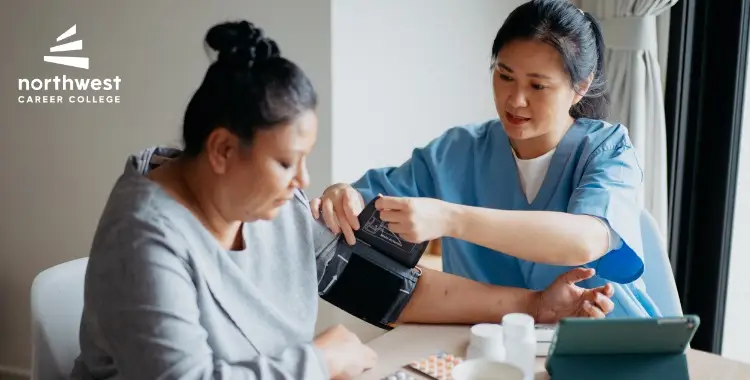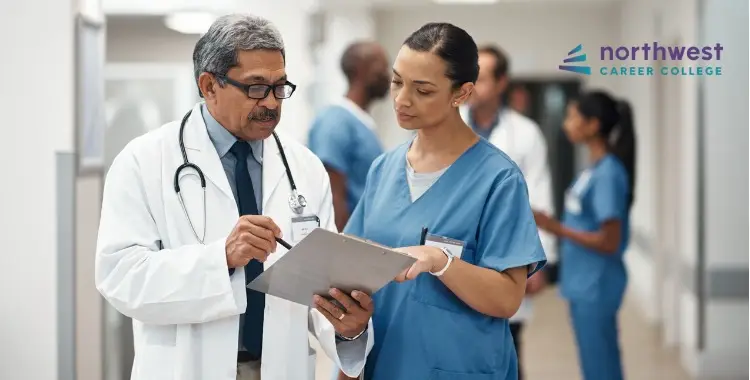How To Best Assist Elderly Patients?
- Medical Assistant
- February 24, 2025
- 3.4k views
- 4 min read

The number of people classified as “elderly”, that is to say over the age of 65, in the U.S. population is predicted to rise 200% by 2030. With a potential 71 million elderly Americans seeking healthcare over the next decade, medical assistants will be assisting more patients over the age of 65 than ever before. With this in mind, developing your skills when it comes to dealing with the elderly is vital, especially for those who are newly graduated and only just starting their careers in the healthcare sector.
While it is important not to generalize when it comes to elderly patients, each patient should be treated as an individual with specific needs, there are broad challenges that must be considered when interacting with them. Many elderly patients will have physical and mental impairments which will require special attention to overcome. To assist you in this, we have collected a range of strategies and tactics that will help you to keep your elder patients safe and happy.
Table of Contents
So, How To Best Assist Elderly Patients?
1. Take your time – Certain physical impairments, such a loss of hearing or sight, can make communication and the gathering of information from elderly patients a challenge. As a rule, people with these impairments already have strategies and the experience to overcome them, but this may take some time. As a medical assistant, you should set aside extra time to assist impaired patients, so as to make sure they don’t feel rushed or that they are a burden.
2. Provide physical assistance – Always be on hand to provide physical assistance, especially if your patient presents as particularly infirmed. Knowing exactly when to offer assistance is a skill developed with experience, but simply being ready to assist, with tasks such as walking to the examination room, removing clothing and climbing onto the examination table, can provide significant reassurance to your patient.
3. Avoid distractions – Some elderly patients may be suffering from mental illnesses or impairments that make them easily distracted or agitated. If your practice has a high number of these patients, it may be an idea to set aside a space in which you can communicate with them without distractions. Such a space should be quiet, calm and free of visual distractions.
4. Focus your attention – Physical and mental impairments can make it difficult for the elderly to digest what you are trying to communicate to them. This can be exacerbated if you are trying to multitask while attempting to communicate. If your patient has any form of impairment it is best to give them your full attention. All other tasks are secondary to the wellbeing of your practice’s patients. Maintain eye contact with your patient, listen carefully and allow them the time to communicate at a pace they are comfortable with.
5. Explain as you go – Remember that for those elderly patients who have physical or mental impairments, healthcare visits can be a confusing and frightening experience. Make sure you take every opportunity to explain what you are doing, and what will be happening in the near future, in a clear and concise manner. This will help put your patients at ease and provide them with better healthcare experience.
Start Your Career In Medical Aassistant Today!
Here at Northwest Career College, we have a student-focused attitude that prioritizes giving our graduates the training and skill set they’ll need to excel as medical assistants. Our established and seasoned instructors work with you, teaching you every aspect of Medical Assistant. We help you build your skills, abilities, and confidence, and we are proud of our 88% national exam pass rate.
If you’d like to learn more about what our medical assistant program can offer you, call one of our enrollment specialists at (702) 403-1592 today. We provide flexible learning, with online and on-campus morning, afternoon and night classes to accommodate your Las Vegas work and family schedule. Once you’ve graduated, our dedicated and experienced Career Services team will work with you to help you find the best employment opportunities in Las Vegas. Call us now on (702) 403-1592 to start your journey!



